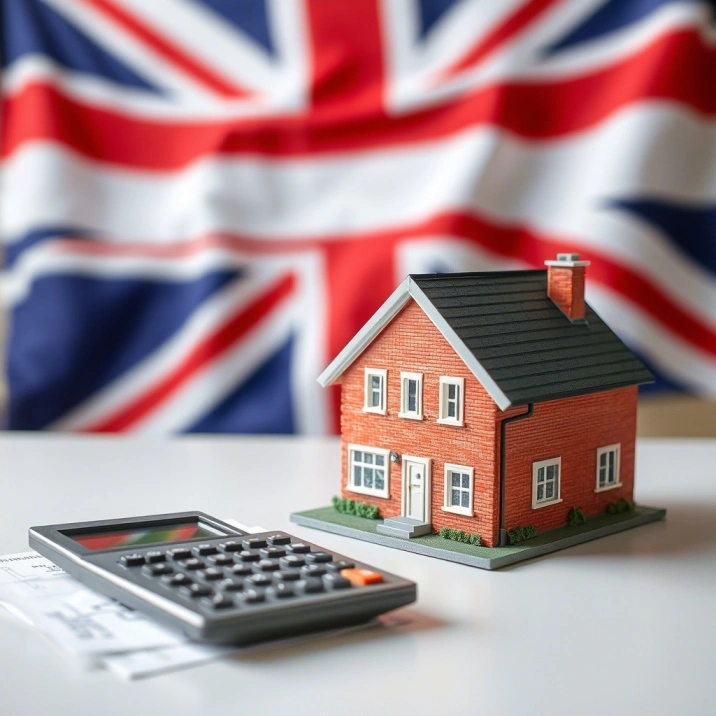What is a Repayment Mortgage?
Introduction to Repayment Mortgages
A repayment mortgage is a popular home loan option in the UK. Borrowers pay both the interest and the principal (the amount borrowed) each month. This type of mortgage ensures that by the end of the term, typically 25 years, the loan is fully repaid, and the borrower owns the property outright. Repayment mortgages are considered a secure loan option because they gradually reduce the mortgage debt, providing long-term homeownership without large outstanding debt at the end of the term.
How Does a Repayment Mortgage Work?
With a repayment mortgage, your monthly mortgage payment is split into two parts:
Interest
The cost of borrowing from your mortgage lender.
Principal
A portion of the loan amount that gradually reduces the balance over time.
As each month passes, more of your payment goes towards reducing the loan principal, and less towards interest. This ensures that the total loan is repaid at the end of the mortgage term. This is different from an interest-only mortgage, where you only pay the interest, leaving the principal debt to be repaid in full at the end.
Types of Repayment Mortgages in the UK

There are several types of repayment mortgages available in the UK:
Fixed-Rate Repayment Mortgage
This mortgage type offers a stable interest rate for a set period, ensuring your monthly payments remain the same, regardless of changes in the Bank of England’s base rate.
Variable-Rate Repayment Mortgage
The interest rate can fluctuate depending on the lender’s standard variable rate, influenced by the base rate set by the Bank of England. Monthly payments may rise or fall.
Tracker Mortgage
This type follows the Bank of England’s base rate, meaning your interest rate moves in line with changes in the national rate. If interest rates are low, this can offer savings, but it also poses a risk if rates rise.
Capped-Rate Mortgage
A capped-rate mortgage limits how high your interest rate can rise, providing some protection if interest rates increase.
Advantages of a Repayment Mortgage
Full Ownership at the End of the Term: By the end of the mortgage term, you’ll fully own your home, with no outstanding debt.
Equity Growth: As you repay both interest and principal, you build equity in your home. This equity can be used for future borrowing or to sell the property at a higher value.
Lower Risk: You reduce the risk of facing a large lump sum repayment at the end, as is the case with interest-only mortgages.
Disadvantages of a Repayment Mortgage
Higher Monthly Payments: Compared to interest-only mortgages, your monthly payments are higher since they cover both interest and principal.
Less Financial Flexibility: If you experience a change in income or unexpected financial difficulties, meeting the full monthly payments may become challenging.
Repayment Mortgages vs Interest-Only Mortgages
With a repayment mortgage, each payment reduces the loan principal and pays off interest, ensuring the loan is fully repaid by the end of the term. In contrast, an interest-only mortgage requires borrowers to repay the entire principal at the end of the term, meaning you’ll need a repayment plan or savings in place.
Many homeowners prefer repayment mortgages for the peace of mind they offer, ensuring they won’t face a large debt at the end of the loan period. Interest-only mortgages are more suitable for those with a clear strategy to repay the loan at the end.
Who Should Consider a Repayment Mortgage?

A repayment mortgage is ideal for:
First-time buyers
It offers a clear and straightforward way to repay the mortgage and own a home outright for first-time buyers.
Long-term homeowners
For those planning to stay in their property for many years, a repayment mortgage ensures full homeownership at the end of the term.
Those prioritizing security
It’s a great option for individuals who want the certainty of gradual debt repayment and full ownership at the end of the mortgage term.
How to Calculate Repayment Mortgage Costs
The cost of a repayment mortgage is determined by:
The loan amount
The total amount borrowed from the mortgage lender.
The interest rate
Fixed or variable rates influence how much interest is paid each month.
Mortgage term
The length of the mortgage is usually 25 years, but shorter or longer terms are available. Longer terms reduce monthly payments but increase the total interest paid.
Using a mortgage calculator can help estimate your monthly payments and give a clearer idea of affordability. It’s also important to factor in additional costs like stamp duty and legal fees when planning your budget.
Factors to Consider Before Choosing a Repayment Mortgage
Before committing to a repayment mortgage, consider:
Length of mortgage term
A shorter term results in higher monthly payments but lower total interest costs, while a longer-term reduces monthly payments but increases the interest paid over time.
Affordability
Make sure you can comfortably manage the monthly payments. UK lenders typically conduct an affordability assessment to ensure borrowers can handle repayments, even if interest rates rise.
Interest rates
Fixed-rate mortgages offer stability, while variable and tracker mortgages can offer lower initial payments but pose the risk of increasing rates.
FAQs About Understanding Repayment Mortgages in the UK
How does a repayment mortgage work?
A repayment mortgage is the UK’s most straightforward home loan setup. Each month, you pay back a bit of the borrowed amount (the capital) plus interest—say, £900 on a £200,000 loan at 4.5% over 25 years. Early on, most of your payment covers interest, but over time, more chips away at the capital. By the end—say, 2050 if you start in 2025—you own the home outright, with no debt left. It’s like renting from yourself, steadily building equity. Lenders base it on your income (typically 4-4.5 times your salary), and rates can be fixed or variable.
What are the disadvantages of a repayment mortgage?
It’s not all smooth sailing. The biggest drawback is higher monthly payments compared to interest-only mortgages—£900 vs. maybe £600 on that £200,000 loan—since you’re tackling capital too. Early in the term, you barely dent the debt; after 5 years on a 25-year deal, you might still owe 90% of the original sum. If rates rise, fixed deals ending soon could sting. And if you need to sell early, slow equity growth might leave you short. It demands steady cash flow, tricky if your income dips.
What is the key advantage of a repayment mortgage?
The standout perk is certainty. You’ll own your home free and clear by the end. Unlike interest-only, where you owe the full £200,000 after 25 years unless you’ve saved separately, repayment clears the slate. UK buyers love this—over 70% of mortgages were repayment in 2023 (FCA data)—because it’s a built-in finish line. Each payment boosts your stake, so by year 15, you might own half the property. It’s peace of mind, especially in a market like the UK’s, where property is a long-term play.
What is a repayment plan on a mortgage?
A repayment plan is just the schedule baked into a repayment mortgage—how much you pay monthly to cover both interest and capital over the term, usually 20-35 years. For a £200,000 loan at 4.5%, your plan might mean £900 a month until 2050, with payments split (e.g., £600 interest, £300 capital at first, flipping later). It’s set by the lender based on the rate, loan size, and term length. You can tweak it—overpay to shorten it or extend if cash gets tight—but it’s the roadmap to zero debt.
Conclusion
A repayment mortgage is a solid choice for UK homebuyers who want to ensure full ownership of their property by the end of the mortgage term. By repaying both interest and principal, you gradually reduce your mortgage debt while building equity in your home.
Whether you’re a first-time buyer or looking for long-term security, a repayment mortgage provides a clear path to homeownership. For tailored advice, it’s always best to consult with a mortgage advisor to find the right mortgage product for your needs.
